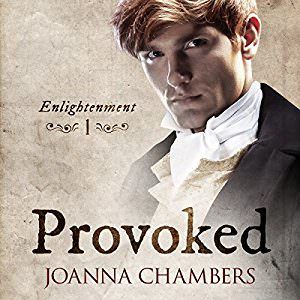Joanna Chamber’s Enlightenment trilogy was originally published in print in 2013/14, and as the books are among my favourite historical romances, I was delighted when I learned they would be coming to audio with a carefully selected – Scottish – narrator. Set in Edinburgh in the 1820s, the three books in the series chart the relationship between hard-working advocate David Lauriston and Lord Murdo Balfour, two men of very different social standing and outlook. Their romance (which develops across the series, so it’s necessary to read all three books in order to reach the HEA) is set against a very strongly written historical backdrop in which the atmosphere of political unrest and uncertainty prevalent at the time is splendidly evoked. Scotland chafes under English rule, the new monarch, George IV, is deeply unpopular, and right from the start, the listener is left in no doubt that these are very troubled times.
David Lauriston is the son of a tenant farmer who, by dint of his own hard work and talent, has put himself through university, qualified as an advocate (the Scottish equivalent of an English barrister) and is now slowly building a practice in Edinburgh. One of his most recent cases was to represent a group of weavers accused of treason – in spite of the fact that their conviction was a foregone conclusion – and the book opens on the day two of the group are sent to the gallows. David has travelled to Stirling to witness the execution as a mark of respect to the two men, and finds himself almost caught up in an altercation when the crowd turns ugly.
On his final night in the city, David meets and dines with a handsome, aristocratic gentleman who introduces himself as Murdo Balfour. David is instantly attracted to him, but firmly squashes –or tries to – such feelings, until his companion subtly conveys that David’s interest is returned. Not expecting he will ever see Balfour again, David decides to allow himself to ‘lapse’; the two men act on the attraction that is sparking between them – and afterward, they go their separate ways. This suits David; he is always filled with self-loathing after his rare sexual encounters with men, preferring to keep them anonymous and never entertaining any repeat performances. But sex with Murdo Balfour was something unexpected and outside David’s range of experience; for the first time ever he felt something more than simple sexual gratification and much as he wants to, he can’t just forget about it. Or Murdo Balfour.
When David returns to Edinburgh, he is approached by Euan MacLennan, whose brother was one of the weavers David defended and who was convicted and transported rather than executed. Euan asks David if he will help track down the agent provocateur responsible for betraying the group, but David is reluctant to become involved, believing the young man is motivated purely by grief and rage. When he realises that Euan will proceed with or without his help – and might well find himself at the end of a rope as a result – he agrees to see what he can find out, little suspecting that what he discovers could turn out to have significant repercussions for himself as well as his friend.
When David is invited to dinner at the home of his mentor, Patrick Chalmers, he is astonished when one of the other guests is none other than Murdo Balfour – whom, David now discovers, is not plain Mr. Balfour at all, but ‘Lord Murdo’, the second son of a marquess. Uncomfortable at once again meeting the man who has occupied so many of his recent thoughts and dreams, David is reassured when Murdo greets him as if they have never met, although he can’t completely relax his guard in the other man’s presence.
Murdo is going to be in Edinburgh for some time, and tells David that he would like to see him again. In spite of David’s self-imposed rule of ‘no repeat performances’, he can’t help being drawn to Murdo, who is his opposite in almost every way. He can’t forget the way he felt when he was with Murdo and wants to experience that again, no matter the guilt he knows he will feel afterwards. Even though David doesn’t try to deny his sexual preference for men, he can’t fully accept it or see it as anything other than unnatural, and it’s this difference in attitude – David’s repression while Murdo is far more comfortable in his own skin and with his sexuality – that is the main source of conflict between them. Their relationship is, at this stage, founded mostly on physical attraction, and because the story is told entirely from David’s PoV, Murdo remains rather an enigmatic figure. At first, he seems arrogant and self-centred – he’s rich, handsome, titled and more than willing to take his pleasures where he finds them – but as the story progresses, he begins to reveal more of himself to David, although David, weighed down with worries about Euan McLennan and by his own guilt, doesn’t always see what’s under his nose.
The plotline concerning McLennan’s search for the agent provocateur is nicely done and employs some subtle twists and turns, and Ms. Chambers has laid the groundwork for one of the major plotlines to come; but by the end of this book, it seems that the gulf between David and Murdo in terms of their wants and expectations is too great, and they part, possibly for ever.
As Provoked is set principally in Edinburgh and most (if not all) of the characters are Scottish, it makes perfect sense that the author would have chosen a native Scot to narrate her story. Hamish McKinlay is a new-to-me narrator and I can only find this title to his credit at Audible. However, if it’s his first time narrating an audiobook, I can’t say that I’d have realised it because he delivers an excellent performance on all counts. Both central characters are perfectly realised and Mr. McKinlay has clearly paid close attention to the comments in the text indicating that David has smoothed out his natural accent and that Murdo sounds pretty much like an Englishman. David’s light, lilting tone contrasts well with the deeper, more resonant one employed for Murdo, and Mr McKinlay does a terrific job with the English accent, which is consistent and slightly plummy. Given that aristocrats at this time were generally educated at English public schools (we call them public although one pays a fee to attend!), it makes perfect sense that Murdo would not have a Scottish brogue. All the secondary characters are well differentiated, although I admit that the American lady who speaks a line or two fairly early on in the story made me wince just a bit. But otherwise, the important characters of Euan, Chalmers and Elizabeth Chalmers are all strongly portrayed, and the narrator does an excellent job in conveying the strong emotions that often bubble beneath the surface of David and Murdo’s verbal exchanges.
In audio, Provoked is every bit as engrossing as I remember it, and there’s no doubt that Hamish McKinlay’s polished performance is a very strong enhancement. I have no hesitation in recommending this audiobook to fans of well-written historical romance that places a strong emphasis on the ‘historical’ part of the label and am eagerly looking forward to listening to the rest of the series.
[You may also like: An Interview with Joanna Chambers]Caz
Buy Provoked by Joanna Chambers on Amazon





2 thoughts on “Provoked by Joanna Chambers”
Comments are closed.